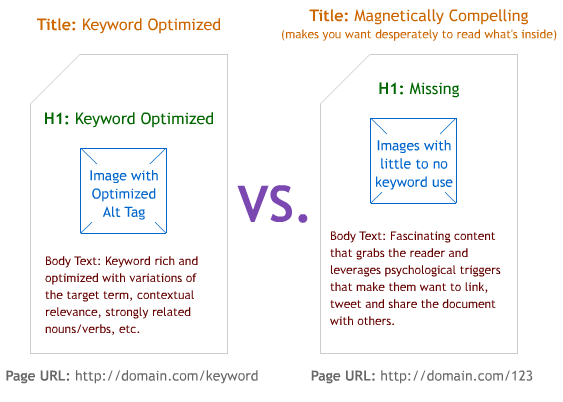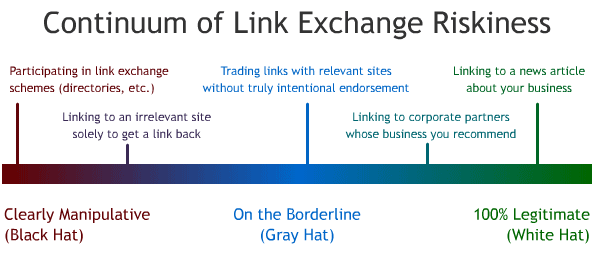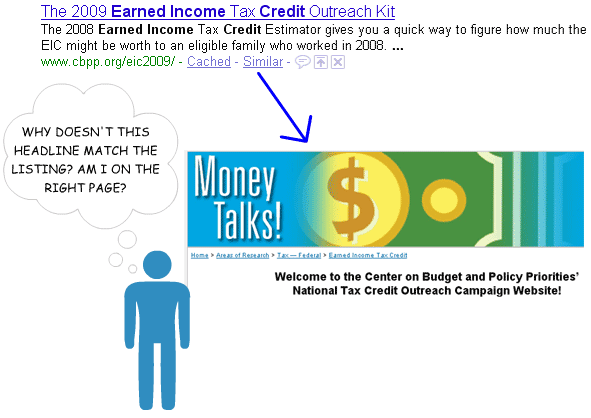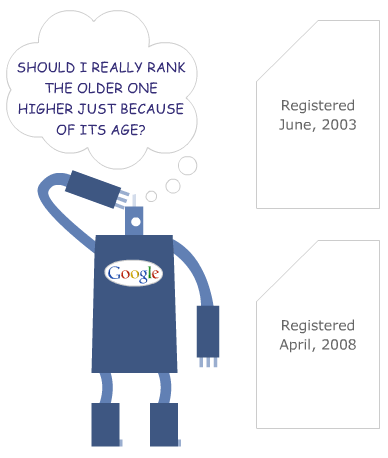
5 Common Pieces of SEO Advice I Disagree With
The author's views are entirely their own (excluding the unlikely event of hypnosis) and may not always reflect the views of Moz.
Over the years, I've heard a number of recommendations for SEO given out that I simply don't understand or find logically flawed. I thought it might be interesting to share some of these and hear more perspectives. It could be that I just don't comprehend the reasoning or haven't thought things through, but I personally don't always recommend these, so it's worth at least a discussion.
#1 - Succesful SEO Copywriting = Keywords & Content Structure
Here's an example of two pages upon which different kinds of SEO has been performed:

I struggle with the fact that 90%+ of the SEO copywriting advice I see on the web or hear at conferences relates to the use of keywords and the content structure (I'm guilty of this myself sometimes, but have been trying to break that habit). While those things may add value from a technical algorithmic ranking perspective, the value of even one additional external link, at least in my opinion, dwarfs the value of having the keyword repeated in the H2 tag the correct number of times.
It seems to me that if and when copywriters are given the knowledge to understand the web's ecosphere around their content arena, and asked to target those who share and spread content on the web, their SEO work is likely to add far more value. That shouldn't stop SEOs and writers from employing good keyword usage practices, but I wish I saw more about how to "write for the Linkerati" and leverage the emotions that make people link.
#2 - Never Exchange Links with Other Sites
There's been so much fear pushed around the web about reciprocal link exchanges and link trading programs that the message has been muddled up into the completely nonsensical "never link to someone who links to you." To my mind, that's a touch of lunacy. The web's link graph is meant to be representative of the connections, endorsements and relationships of the real world. Artificially manipulating it, even when you're doing so because you think Google wants you to, doesn't make much sense.
The advice holds true when an offer comes via email suggesting you link to a site with which you have no relationship and, in exchange, they'll link to you. It holds true when a directory wants you to link to it in order to get a link out. It doesn't hold true when some blogger has said something you care about and linked to you, or when a business partner has endorsed your work and is hoping you can reciprocate. I created a handy little risk chart to help explain my positions on "reciprocal" links:

For example, there's nothing wrong with SEOmoz linking to Distilled's website - our partners in the UK - and likewise, getting a link back from them. If, however, we weren't actually partners but only linked back and forth in order to artificially inflate one another's link popularity, it's a different story.
#3 - Rewrite the H1 Headline to Be Unique from the Title Tag
I'm not sure exactly where this advice originated, but I've heard it from some SEOs I really respect, including my good friend Todd Malicoat. Still, I'm highly skeptical. I've tried it a few times in test environments and looked at some rough correlation data - both of which suggesting that there's no particular benefit to having unique titles vs. H1s.

The big reason I'm against it is that H1s are intended to be the "headline" of a page, and if you click on a search result, then see a different headline on the page itself, it's a very off-putting experience. This is one of those times when, even if it was good for SEO, I think the usability argument might trump. The expectation created by a title is that the article will be that precise piece. I have trouble imagining search engineers deciding that disparity between the two should result in a higher ranking.
#4 - Never Spam Report Your Competitors
A number of arguments are made against spam reporting the competition when they've employed tactics that violate the search engine guidlines. Some operators in the field want to make this a moral or ethical issue (AKA - the "thieves pact" made by being an SEO must be honored). However, since there's no way to verify whether a particular SEO does or does not submit their competitors' manipulative tactics to the engines, it could easily be that those most vocal about rejecting it as a path to success are actually the same ones who employ it most. Nothing stops an SEO from claiming to adhere to the "no outing" code while quietly turning in all of his/her cohorts.
This paradigm makes one path obvious - don't say, at least publicly, that you report spam. Vocal parts of the SEO community are vehement about making examples of (and socially shunning/shaming) those who violate this "code of silence." However, from a practicality standpoint, it may still be valuable to your business to call out spam to the search engines so your site/page has a more level playing field from which to operate (as a white hat, competing against spammers is no fun). The vast majority of smart SEOs I've ever encountered expect that their sites are being consistently spam reported and thus engage only in tactics that are either 100% white hat or which they feel confident the engines will be hard pressed to discover (to my mind, the former makes far more sense).
Talking to lots of friends in the field, there seem to be a number of arguments in favor of spam reporting:
- You may be able to improve your own ranking by removing a competitor
- It's a very low time/cost activity and typically a valuable learning experience (even those against reporting still strongly endorse researching and learning from those who do use black/gray hat tactics)
- You may gain trust in the eyes of the search engines (so long as you are 100% clean yourself)
- The spam you report may make its way into the index in a scalable way, pushing out multiple manipulators and thus leaving more room, on a macro scale, for your site to perform positively
- You can get a better sense for what the engines do/don't tolerate and to what degree by seeing which tactics warrant immediate penalties vs. long delays or no action at all
- You may help the engines provide better search results for all users, thus increasing the overall value of the web
And a few reasons against:
- You may inadvertently hurt your own site's rankings if you've engaged in (or unknowingly benefitted from) particular types of spam
- Reporting spam may hurt your fellow SEOs (gray or black hat though their tactics may be) and is thus unethical
The ethics argument against is certainly the most compelling, and as SEOmoz prides itself so highly on the ethics and values we adopt, I thought a quick review of the subject was in order. Thus, I checked out some great works on ethics from the Markula Center for Applied Ethics at Santa Clara University. In particular, I found it valuable to read What is Ethics, as well as Whistle Blowing in the Public Sector. My basic takeaway is that If you believe that search engines are an oppressive (or potential oppressive) entity that does not have the best interests of the web or its users in mind, then complying with their request to help punish abusers has some ethical concerns. Likewise, if you feel that those who spam or manipulate the engines' indices are removing value from the web's usefulness, you may have similar ethical concerns staying quiet. Similar to reporting criminals for violating unjust laws (or turning them in to a corrupt, oppresive regime), the ethics of the situation depends greatly on your view of the engines and those who violate their guidelines.
#5 - A Site's Age is Indicative of Ranking Ability
This is one area where I worry considerably about the value of correlation data. While sites that have longer history may indeed have a greater proclivity for high rankings, I don't personally believe that the engines use a raw "age" metric or even an "age of links" metric to inflate potential rankings.

The "age of site" or "age of links" argument relies on the idea that search engineers believe age to be equated with higher quality. While there may certainly be value in analyzing the temporal nature of links and content, I struggle to think that older universally (or even mostly) correlates with a better result and better user experience. Age may have some bearing on certain kinds of rankings in specific scenarios and could play a role in trust/spam analysis as well, but that doesn't mean it's necessarily a positive metric for judging overall potential performance.
Obviously, this post is largely opinion-based, and like all material on the blog, shouldn't be misconstrued as anything else. I'm looking forward to discussion on these topics in the comments.




Comments
Please keep your comments TAGFEE by following the community etiquette
Comments are closed. Got a burning question? Head to our Q&A section to start a new conversation.